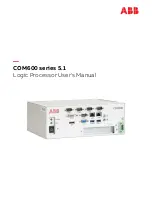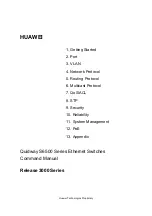
114 Hitachi
3.
When set for sequential conditions (the SEQ bit of BRCR is 1) and the instruction fetch cycle
of the A channel CPU is set as a condition, set channel A for before instruction execution
(PCBA bit of BRCR is 0).
4.
When register settings are changed, the write values usually become valid after three cycles.
For on-chip memory, instruction fetches get two instructions simultaneously. If a break
condition is set on the fetch of the second of these two instructions but the contents of the
UBC registers are changed so as to alter the break condition immediately after the first of the
two instructions is fetched, a user break interrupt will still occur before the second instruction.
To ensure the timing of the change in the setting, read the register written last as a dummy.
The changed settings will be valid thereafter.
5.
When a user break interrupt is generated upon a match of the instruction fetch condition and
the conditions match again in the UBC while the exception processing service routine is
executing, the break will cause exception processing when the I3–I0 bits of the SR are set to
14 or lower. When masking addresses, when setting instruction fetch and after-execution as
break conditions, and when executing in steps, the UBC’s exception processing service
routine should not cause a match of addresses with the UBC.
6.
When the emulator is used, the UBC is used on the emulator system side to implement the
emulator's break function. This means none of the UBC functions can be used when the
emulator is being used.
6.3.8
SH7000-Series Compatibility Mode
1.
In SH7000-series compatible mode:
In SH7000-series compatible mode, functions are as follows:
•
The registers shown in the lower table in section 1.3, Register Configuration, are valid; all
others are not.
•
External bus breaks are not possible in SH7000 mode. The instruction fetch cycle occurs
prior to instruction execution. The flags are not set when break conditions match.
2.
Differences between SH7000 compatible mode and SH7095 mode:
When set for CPU instruction fetch cycle in the SH7000-series compatible mode, the break
occurs before the instruction that matches the conditions. The break conditions differ as
shown below from setting for before-execution in SH7095 mode. For data access cycles, the
address is always compared to 32 bits in the SH7000-series compatible mode, but in SH7095
mode is compared as shown in table 6.3. This produces the differences in break conditions
shown in table 6.4.
Summary of Contents for SH7095
Page 1: ...SH7095 Hardware User Manual ...
Page 23: ...12 Hitachi ...
Page 63: ...52 Hitachi ...
Page 77: ...66 Hitachi ...
Page 105: ...94 Hitachi Figure 5 14 Pipeline Operation when Interrupts are Enabled by Changing the SR ...
Page 127: ...116 Hitachi ...
Page 152: ...Hitachi 141 Figure 7 8 Example of 32 Bit Data Width SRAM Connection ...
Page 157: ...146 Hitachi Figure 7 13 Synchronous DRAM 32 bit Device Connection ...
Page 161: ...150 Hitachi Figure 7 15 Basic Burst Read Timing Auto Precharge ...
Page 167: ...156 Hitachi Figure 7 20 Burst Read Timing Bank Active Same Row Address ...
Page 168: ...Hitachi 157 Figure 7 21 Burst Read Timing Bank Active Different Row Addresses ...
Page 169: ...158 Hitachi Figure 7 22 Write Timing No Precharge ...
Page 170: ...Hitachi 159 Figure 7 23 Write Timing Bank Active Same Row Address ...
Page 180: ...Hitachi 169 Figure 7 29 Example of a DRAM Connection 32 Bit Data Width ...
Page 190: ...Hitachi 179 Figure 7 36 Example of Pseudo SRAM Connection 1 M pseudo SRAM ...
Page 191: ...180 Hitachi Figure 7 37 Example of Pseudo SRAM Connection 4 M pseudo SRAM ...
Page 209: ...198 Hitachi Figure 7 50 Master and Partial Share Master Connections ...
Page 231: ...220 Hitachi ...
Page 287: ...276 Hitachi ...
Page 307: ...296 Hitachi Note For a CPU writing H AA55 to FRC Figure 11 2 FRC Access Operation Write ...
Page 308: ...Hitachi 297 Note For an FRC reading from a CPU H AA55 Figure 11 3 FRC Access Operation Read ...
Page 333: ...322 Hitachi ...
Page 370: ...Hitachi 359 Figure 13 12 Sample Flowchart for Receiving Multiprocessor Serial Data ...
Page 371: ...360 Hitachi Figure 13 12 Sample Flowchart for Receiving Multiprocessor Serial Data cont ...
Page 395: ...384 Hitachi ...
Page 402: ...Hitachi 391 Figure 15 6 PLL Synchronization Settling Timing ...
Page 408: ...Hitachi 397 Figure 15 13 Bus Release Timing Slave Mode With PLL1 Off ...
Page 436: ...Hitachi 425 Figure 15 33 Synchronous DRAM Mode Register Write Cycle TRP 1 Cycle ...
Page 437: ...426 Hitachi Figure 15 34 Synchronous DRAM Mode Register Write Cycle TRP 2 Cycles ...
Page 449: ...438 Hitachi Figure 15 46 DRAM CAS Before RAS Refresh Cycle TRP 1 Cycle TRAS 2 Cycles PLL On ...
Page 454: ...Hitachi 443 Figure 15 51 DRAM CAS Before RAS Refresh Cycle TRP 1 Cycle TRAS 2 Cycles PLL Off ...
Page 461: ...450 Hitachi Figure 15 58 Pseudo SRAM Auto Refresh Cycle PLL On TRP 1 Cycle TRAS 2 Cycles ...
Page 462: ...Hitachi 451 Figure 15 59 Pseudo SRAM Self Refresh Cycle PLL On TRP 1 Cycle TRAS 2 Cycles ...
Page 467: ...456 Hitachi Figure 15 64 Pseudo SRAM Auto Refresh Cycle PLL Off TRP 1 Cycle TRAS 2 Cycles ...
Page 468: ...Hitachi 457 Figure 15 65 Pseudo SRAM Self Refresh Cycle PLL Off TRP 1 Cycle TRAS 2 Cycles ...
Page 471: ...460 Hitachi Figure 15 68 Interrupt Vector Fetch Cycle PLL On No Waits ...
Page 472: ...Hitachi 461 Figure 15 69 Interrupt Vector Fetch Cycle PLL Off No Waits ...
Page 473: ...462 Hitachi Figure 15 70 Interrupt Vector Fetch Cycle 1 External Wait Cycle ...
Page 474: ...Hitachi 463 Figure 15 71 Address Monitor Cycle ...
Page 490: ...Hitachi 479 B 2 Register Chart ...
















































